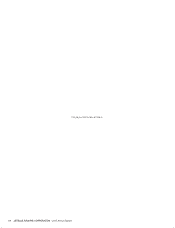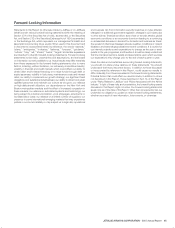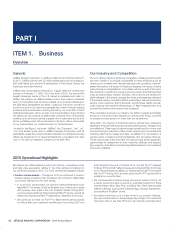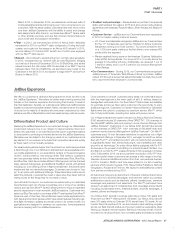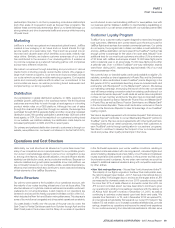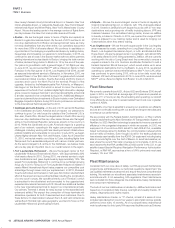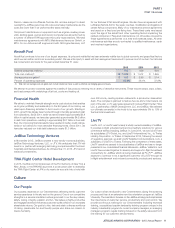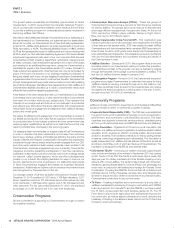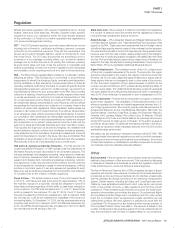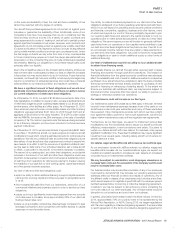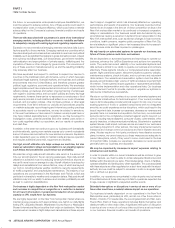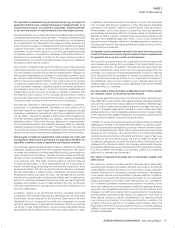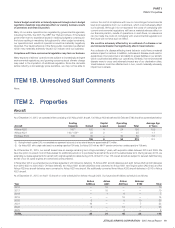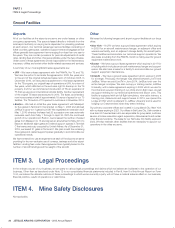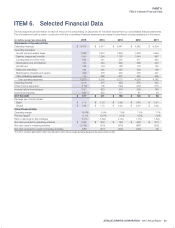JetBlue Airlines 2015 Annual Report Download - page 17
Download and view the complete annual report
Please find page 17 of the 2015 JetBlue Airlines annual report below. You can navigate through the pages in the report by either clicking on the pages listed below, or by using the keyword search tool below to find specific information within the annual report.
JETBLUE AIRWAYS CORPORATION-2015Annual Report 13
PART I
ITEM 1Business
Regulation
Airlines are heavily regulated, with rules and regulations set by various
federal, state and local agencies. We also operate under specific
regulations due to our operations within the high density airspace
of the northeast U.S. Most of our airline operations are regulated by
U.S. governmental agencies including:
DOT – The DOT primarily regulates economic issues affecting air service
including, but not limited to, certification and fitness, insurance, consumer
protection and competitive practices. They set the requirement that
carriers cannot permit domestic flights to remain on the tarmac for more
than three hours. The DOT also requires that the advertised price for
an airfare or a tour package including airfare, e.g., a hotel/air vacation
package, has to be the total price to be paid by the customer, including
all government taxes and fees. It has the authority to investigate and
institute proceedings to enforce its economic regulations and may assess
civil penalties, revoke operating authority and seek criminal sanctions.
FAA – The FAA primarily regulates flight operations, in particular, matters
affecting air safety. This includes but is not limited to airworthiness
requirements for aircraft, the licensing of pilots, mechanics and dispatchers,
and the certification of flight attendants. It requires each airline to obtain an
operating certificate authorizing the airline to operate at specific airports
using specified equipment. Like all U.S. certified carriers, we cannot fly to
new destinations without the prior authorization of the FAA. After providing
notice and a hearing, it has the authority to modify, suspend temporarily
or revoke permanently our authority to provide air transportation or that
of our licensed personnel for failure to comply with FAA regulations. It
can additionally assess civil penalties for such failures as well as institute
proceedings for the imposition and collection of monetary fines for the
violation of certain FAA regulations. When significant safety issues are
involved, it can revoke a U.S. carrier’s authority to provide air transportation
on an emergency basis, without providing notice and a hearing. It monitors
our compliance with maintenance as well as flight operations and safety
regulations. It maintains on-site representatives and performs frequent
spot inspections of our aircraft, employees and records. It also has the
authority to issue airworthiness directives and other mandatory orders.
This includes the inspection of aircraft and engines, fire retardant and
smoke detection devices, collision and windshear avoidance systems,
noise abatement and the mandatory removal and replacement of aircraft
parts that have failed or may fail in the future. We have and maintain FAA
certificates of airworthiness for all of our aircraft and have the necessary
FAA authority to fly to all of the destinations we currently serve.
TSA and U.S. Customs and Border Protection – The TSA and the U.S.
Customs and Board Protection, or CBP, operate under the Department of
Homeland Security and are responsible for all civil aviation security. This
includes passenger and baggage screening; cargo security measures;
airport security; assessment and distribution of intelligence; security
research and development; international passenger screening; customs;
and agriculture. It also has law enforcement powers and the authority
to issue regulations, including in cases of national emergency, without
a notice or comment period. It can also assess civil penalties for such
failures as well as institute proceedings for the imposition and collection
of monetary fines for the violation of certain regulations.
Taxes & Fees – The airline industry is one of the most heavily taxed
in the U.S., with taxes and fees accounting for approximately 17% of
the total fare charged to a customer. Airlines are obligated to fund all of
these taxes and fees regardless of their ability to pass these charges on
to the customer. The TSA sets the September 11, or 9/11, Security Fee
which is passed to the customer. On July 21, 2014, the 9/11 Security
Fee was increased from $2.50 per enplanement, with a maximum of $5
per one-way trip, to $5.60 per enplanement, regardless of the number of
connecting flights. On December 19, 2014, the fee was amended and a
round trip was limited to a maximum of $11.20. Effective December28,
2015, the APHIS Aircraft Inspection fee increased from $70.75 to $225
per international aircraft arriving in the U.S.
State and Local – We are subject to state and local laws and regulations
in a number of states in which we operate and the regulations of various
local authorities operating the airports we serve.
Airport Access – JFK, LaGuardia, Newark and Reagan National are Slot-
controlled airports subject to the “High Density Rule” and successor rules
issued by the FAA. These rules were implemented due to the high volume
of traffic at these popular airports located in the northeast corridor airspace.
The rules limit the air traffic in and out of these airports during specific times;
however, even with the rules in place, delays remain among the highest in
the nation due to continuing airspace congestion. We additionally have Slots
at other Slot-controlled airports governed by unique local ordinances not
subject to the High Density Rule, including Westchester County Airport in
White Plains, NY and Long Beach (California) Municipal Airport.
Airport Infrastructure – The northeast corridor of the U.S. contains some
of the most congested airspaces in the world. The airports in this region
are some of the busiest in the country, the majority of which are more than
60 years old. Due to high usage and aging infrastructure, issues arise at
these airports that are not necessarily seen in other parts of the country.
At JFK, the recent completion of high-speed taxiways, in addition to the
runway renovations finished in 2015, enables landing aircraft the ability to
exit the runway faster. The Unified Terminal Structure project at LaGuardia
has been delayed and is still pending final approval which is expected in
early 2016. Once underway, it is expected to open to passengers in 2019.
Foreign Operations – International air transportation is subject to extensive
government regulation. The availability of international routes to U.S.
airlines is regulated by treaties and related agreements between the U.S.
and foreign governments. We currently operate international service to
Antigua and Barbuda, Aruba, the Bahamas, Barbados, Bermuda, the
Cayman Islands, Colombia, Costa Rica, Curaçao, the Dominican Republic,
Grenada, Haiti, Jamaica, Mexico, Peru, Saint Lucia, St. Maarten, Trinidad
and Tobago and the Turks and Caicos Islands. As previously announced,
during 2016 we plan to begin service to Ecuador. To the extent we seek to
provide air transportation to additional international markets in the future,
we would be required to obtain necessary authority from the DOT and the
applicable foreign government.
We believe we are operating in material compliance with DOT, FAA, TSA
and applicable international regulations as well as hold all necessary
operating and airworthiness authorizations and certificates. Should any
of these authorizations or certificates be modified, suspended or revoked,
our business could be materially adversely affected.
Other
Environmental – We are subject to various federal, state and local laws
relating to the protection of the environment. This includes the discharge
or disposal of materials and chemicals as well as the regulation of aircraft
noise administered by numerous state and federal agencies.
The Airport Noise and Capacity Act of 1990 recognizes the right of airport
operators with special noise problems to implement local noise abatement
procedures as long as those procedures do not interfere unreasonably
with the interstate and foreign commerce of the national air transportation
system. Certain airports, including San Diego and Long Beach airports in
California, have established restrictions to limit noise which can include
limits on the number of hourly or daily operations and the time of such
operations. These limitations are intended to protect the local noise-
sensitive communities surrounding the airport. Our scheduled flights
at Long Beach and San Diego are in compliance with the noise curfew
limits, but on occasion when we experience irregular operations we may
violate these curfews. We have agreed to a payment structure with the
Long Beach City Prosecutor for any violations which we pay quarterly to
the Long Beach Public Library Foundation. The payment is based on the
number of infractions in the preceding quarter. This local ordinance has not
had, and we believe it will not have, a negative effect on our operations.



